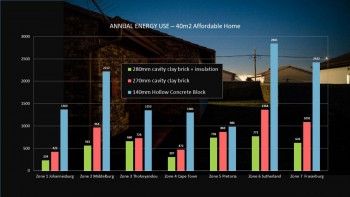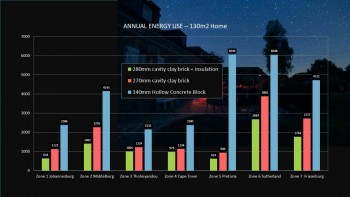Electricity bills soar for remote workers
One unpleasant financial shock for South Africa’s new remote workforce is soaring electricity bills. We may have saved on takeaways, clothes and haircuts, but running a home office and home school isn’t free.
“Many people have commented that this winter seems far colder than normal,” reports Nico Mienie, Technical Director of the Clay Brick Association of Southern Africa.
“We usually spend winter days in temperature controlled offices. Now we are home all day, every day during the coldest months! South African homes are built for indoor-outdoor living, not thermal comfort.”
Reducing Electricity bills
People expecting to work from home in the future, should look at insulation to improve energy efficiency.
There are easy short term solutions. Swap out sheer summer curtains for heavier fabrics, seal doors and windows with weatherstrip, use a home-made draft-stopper to stop cold air coming in under doors. Longer term, change to thicker glass in windows and insulate your roof.
However the most effective way to reduce electricity use for life, is to harness the sun’s natural energy. The best energy-saving features are expensive – or impossible – to retrofit. Therefore architects and developers need to consider energy-efficiency during design and construction of homes.
In the design phase, architects need to be more aware of factors affecting passive design. The home should take advantage of shading during summer to reduce air-conditioning, as well as maximising thermal mass on north-facing walls to store warmth for release during cold nights.
About a third of all the heat lost in an uninsulated home escapes through the walls. By building proper insulated cavity walls, property owners will save energy as well as reducing heating and air-conditioning bills.
A cavity wall is composed of two masonry walls separated by an air space or cavity. The cavity can be partly filled with insulation which is attached to the inner leaf. Insulation provides additional thermal performance. Those with children at home might be pleased to hear that clay brick also provides significant soundproofing benefits!
In comparison, low density materials like hollow concrete blocks allows both heat and cold to penetrate the block quickly, providing minimal protection from extreme temperatures.
Ongoing electricity use is a big expense for home owners, and is likely to increase with more people working and studying at home in the months even years ahead. Sustainable, energy efficient buildings not only reduce operating costs, they also reduce our reliance on aging coal-fired power stations - the source of over 80% of South Africa’s CO2 emissions.



